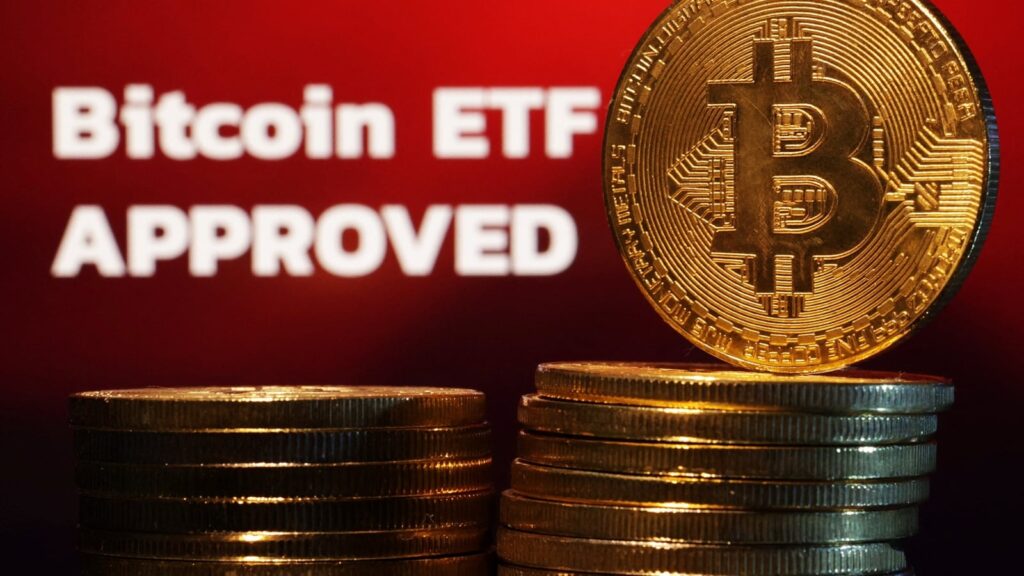India Shouldn’t Hurry to Follow in America’s Footsteps

“`html
As of January 10, the US financial watchdog, the Securities and Exchange Commission (SEC), granted permission for 11 spot Bitcoin exchange-traded funds (ETFs) to be listed and traded on the stock exchange. This development provides a regulated avenue for retail investors to partake in the trading of digital tokens securely. The fate of cryptocurrencies has long swung between calls for outright bans and regulatory frameworks. This recent move suggest that the sentiment is shifting towards regulation. While the US has paved the path for legitimizing digital token trading, India may consider a more cautious approach. Furthermore, it’s essential for investors to grasp the nature of this high-risk speculative trade, rather than mistaking it for a conventional investment.
The sanctioning of Bitcoin ETFs marks a pivotal moment, as Bitcoin will henceforth be treated similar to commodities such as gold or silver within an ETF format. An ETF is essentially a type of mutual fund quoted on the stock exchange, with its value mirroring that of the commodity or index it’s based on. Such a facility enables retail investors to trade cryptocurrencies similarly to other market assets. Prior to this regulatory shift, crypto exchanges largely operated outside regulatory purview, exposing investors to significant risk. This peril was underscored by the November 2022 collapse of FTX, a crypto exchange worth $32 billion, which saw the evaporation of investor funds when the platform’s owner misappropriated client money to support his hedge fund.
With the introduction of Bitcoin ETFs, investors now have a more secure pathway to engage in Bitcoin trading through a regulated segment of the financial market. Yet, the advisability of investing in such assets remains questionable. SEC chairman Gary Gensler has expressed reservations, though he was legally compelled to authorize ETFs for Bitcoin. He has pointed out that traditional metal-based ETFs are backed by assets with consumer and industrial utility, while Bitcoin primarily serves as a highly volatile speculative tool often associated with illegal activities such as ransomware, money laundering, sanctions evasion, and funding of terrorist efforts.
With regulatory bodies keenly observing the evolution of private digital tokens that derive value from public interest rather than tangible assets, the global discourse leans more towards regulation than prohibition. This regulatory stance is reflected in the G20 Delhi declaration, which India has endorsed, asserting that crypto assets should be governed by “…regulation, supervision and oversight.”
The classification of digital currency splits into two: as a transactional medium and as a value store. The compelling case for digital tokens as a cost-effective and swift international money transfer option is apparent, contrasting with the expensive and complex conventional banking system. A World Bank study cites that the average cost to remit $200 across borders stood at an exorbitant 6.25% in 2023.
To mitigate these fees without relinquishing control to decentralized currencies, various countries are exploring direct integrations of their payment systems for global transactions. An illustration is the Nexus initiative by the BIS Innovation Hub in Singapore, piloting connectivity among multiple domestic instant payment systems, with countries like Italy, Malaysia, and Singapore already engaged in trials.
The transactional nature of digital currencies may well be addressed through international cooperation among governments, yet the suitability of cryptocurrencies as an investment still stirs debate. Some enthusiasts declare it an asset class of the future, but there are skeptics like me who view these digital tokens as inherently valueless, their worth contingent merely upon market demand.
While the US’s embrace of a Bitcoin ETF might put similar pressure on other jurisdictions, notably India, where the allure of quick fortune is strong, it is not advisable for such markets to hastily adopt such products. The Reserve Bank of India’s Governor has already indicated that no immediate plans are in place to follow suit. The Ministry of Finance, along with the Securities and Exchange Board of India, would be responsible for framing the necessary regulations. Considering the relatively early stage of financialization and the limited financial literacy in India, prematurely introducing such speculative products is unwise. India should observe how other countries navigate these waters before deciding.
Retail investors are urged to recognize the speculative nature of this investment, which only forms a minor portion of the portfolios for the ultra-wealthy. For the average Indian retail investor, dissolving fixed deposits to invest substantial sums into cryptocurrencies would be inadvisable. Caution is paramount.
Monika Halan is the author of the best-selling book Let’s Talk Money. The views expressed are personal.
“`
Source link
#India #rush #dares






